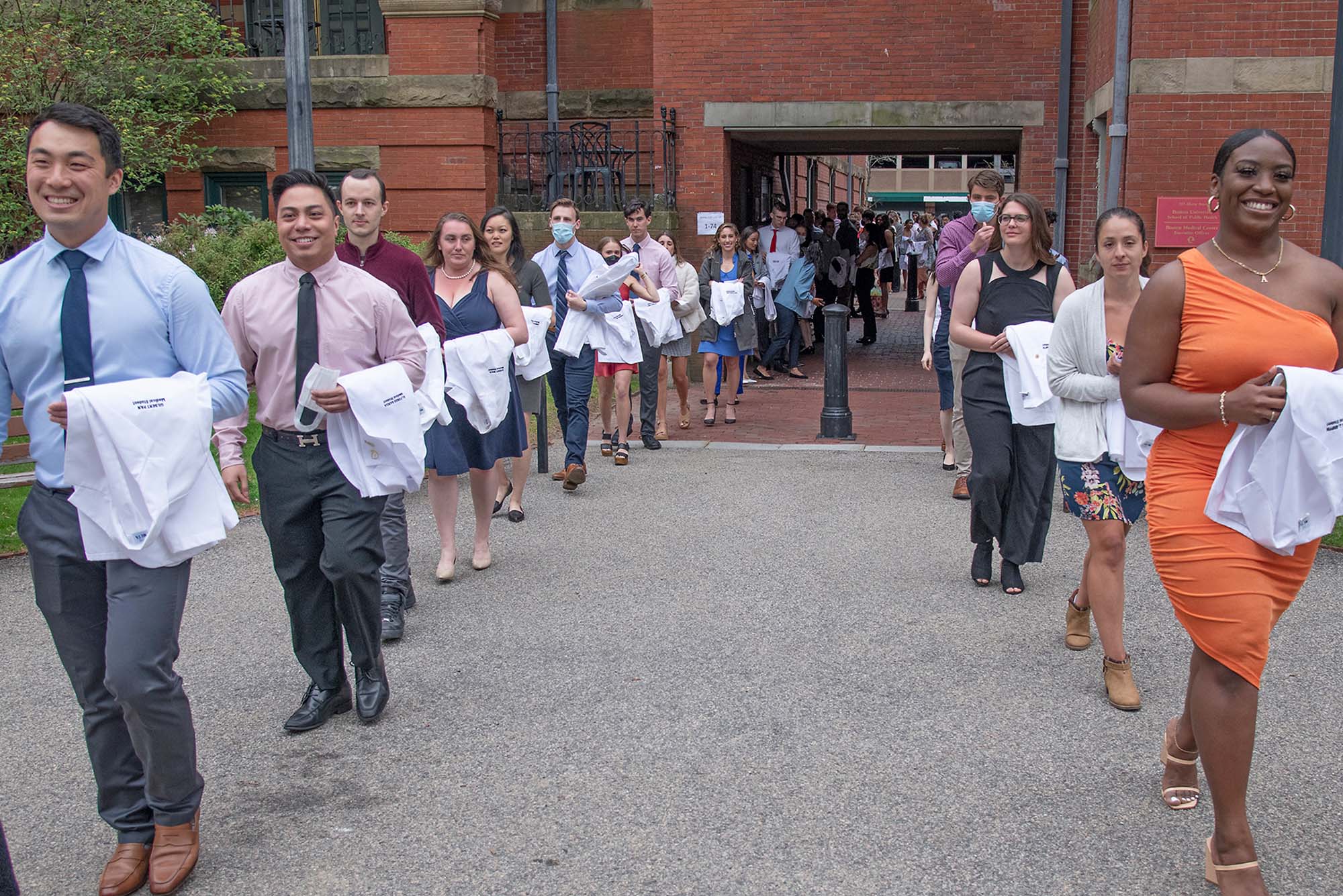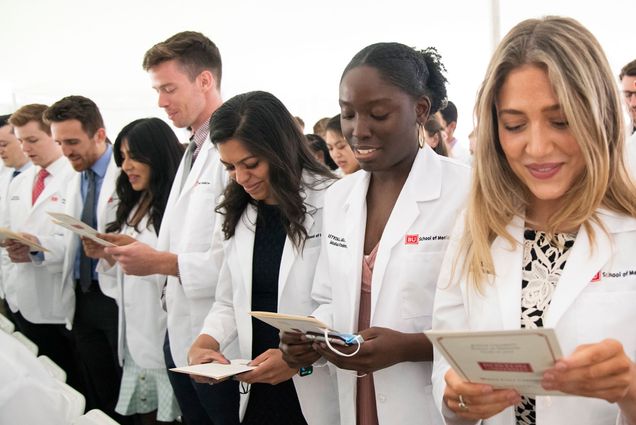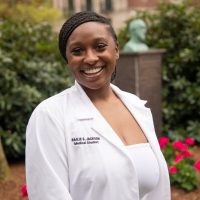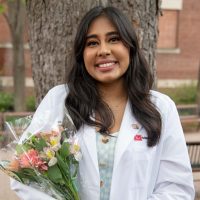After Two-Year Delay, Entering Class of 2020 Celebrate with In-Person White Coat Ceremony
 Coats over their arms, third-year medical students filing into a tent on Talbot Green May 2 for their in-person White Coat Ceremony. They’d had a pandemic-mandated virtual ceremony in August 2020, and Monday’s in-person ceremony was timed to coincide with the beginning of their third year, when their studies transition to clinical rotation.
Coats over their arms, third-year medical students filing into a tent on Talbot Green May 2 for their in-person White Coat Ceremony. They’d had a pandemic-mandated virtual ceremony in August 2020, and Monday’s in-person ceremony was timed to coincide with the beginning of their third year, when their studies transition to clinical rotation.
On May 2, Alex Seren stood in a whirlwind of activity under a large white tent on the Boston University Medical Campus Talbot Green. His fellow third-year medical students greeted one another and their families and friends amid the din of many conversations and the flashes of cellphone cameras.
Seren smiled broadly when asked about participating in his first in-person White Coat Ceremony, albeit two years after he started as a first-year student. The tradition symbolizes the entrance into the study of medicine, but the pandemic caused it to become a virtual event for the 2020 entering class.
In August 2020, white coats embroidered with their names were mailed to the entering students, and they donned them in relative isolation, some alone on the video screen, while for others a parent, partner or friend helped, tugging the coat into place for the camera.
“We all went through a lot of trials and tribulations to get into medical school, and to have that moment where you can celebrate that achievement. I felt we really didn’t get that, that moment when you can say ‘Wow, I did it,’” said Seren.
 Medical students read the Hippocratic Oath during the May 2022 White Coat Ceremony.
Medical students read the Hippocratic Oath during the May 2022 White Coat Ceremony.
“But this makes up for it,” he said, casting an appreciative eye at the crowded tent.
When her coat came in the mail in August 2020, third-year student Bailie Jackson of Dallas said it meant she had arrived.
 Bailie Jackson
Bailie Jackson
“All of our lives we dreamed of being in medical school and being a doctor, and this white coat signified that first step,” she said. After nearly two years in classrooms, hospitals and clinics it was suitably broken in, a bit rumpled, proudly sporting an intractable stain or two.
“It’s gotten a lot of wear-and-tear, but it still holds everything you need,” said Jackson.
Don’t dwell on past losses, Associate Dean for Student Affairs Angela Jackson, MD, advised students.
“One cannot rewind the clock,” she said, but learn from the experience and move forward.
As faculty student advisors assisted students with their coats, cheers went up showing that what could have been just another ritual, a symbolic afterthought, was important to these students.
 Sara Shoushtari
Sara Shoushtari
“It was really special for us to be able to meet together and say the Hippocratic Oath, to remind us of the career we’re embarking on,” said third-year medical student Sara Shoushtari from San Diego.
BUSM Dean Karen Antman, MD, noted that Monday was just the second time the class gathered together, with the only other time being for an ice cream social at the beginning of their second year.
Monday’s ceremony was timed to mark another important transition, the beginning of their third year, when their studies transition to clinical rotations. Antman cautioned students that they would be exposed to some unsettling cases that could deeply affect them.
“The faculty worry if students don’t react to what they see in their transition from student to physician,” she said.
Guest speaker Jessie Gaeta, MD, BUSM assistant professor of medicine and former chief medical officer at Boston Health Care for the Homeless Program, said the white coat “with its crisp outline and square shoulders, the bright bold patches on the sleeves” represented seriousness, solemnity, knowledge and expertise, especially to the suffering patient.
“The coat even resembled, to my young eye, a superhero cape,” she said. But Gaeta challenged the students, who will now spend most of their time with patients, to overcome the images of doctor privilege, paternalism and racism that the coat has also come to represent in the eyes of the underserved and the homeless.
Antman felt that what they’d experienced during the pandemic would ultimately benefit them.
“Your unique experiences in medicine, which you certainly did not anticipate when you applied to medical school, required creativity, adaptability, and commitment, all traits that will undoubtedly make you better physicians.”
See more photos on Facebook.
View all posts